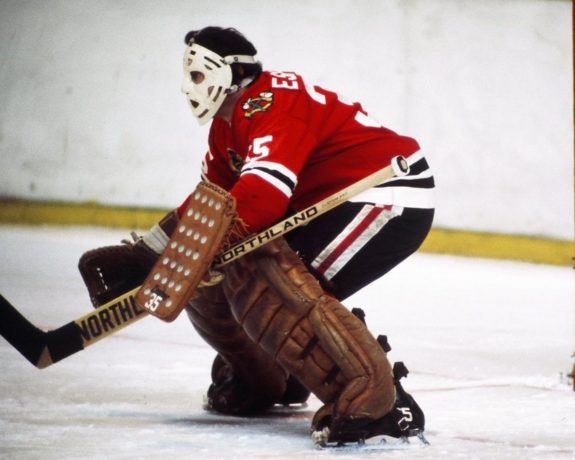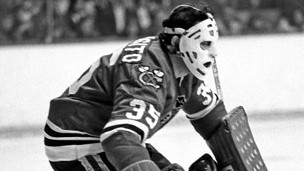When you have been a part of the National Hockey League since 1926, as the Chicago Blackhawks, you will have some storied names. Players who go beyond being mere men and have become almost mythological figures as the years have gone by. The Blackhawks have plenty of those legends, including Stan Mikita, Pierre Pilotte, and Glenn Hall.
The hockey world lost one of those legendary players on Aug. 10, 2021, when goaltender Tony Esposito died at the age of 78 following a short battle with pancreatic cancer.
“It is a sad day for the Blackhawks and all of hockey,” the team said in an official statement. “But with his wonderful family, let us celebrate a life well lived. Tony Esposito’s banner will be part of the United Center forever, as will his legacy as a superstar, on and off the ice.”
“Tony Esposito’s banner will be part of the United Center forever, as will his legacy as a superstar, on and off the ice.”
— Chicago Blackhawks (@NHLBlackhawks) August 10, 2021
–Statement on behalf of #Blackhawks Chairman Rocky Wirtz. pic.twitter.com/iMYl3khEe1
This has been a rough week for the Blackhawks family as Esposito’s death came just a day after former player and current radio analyst Troy Murray announced he was diagnosed with cancer.
The Road to Chicago Begins in Michigan
Esposito was born on April 23, 1943, in Sault Ste. Marie, Ontario. He and his older brother Phil became one of the greatest brother tandems in all of professional sports. While Tony put together a Hall of Fame career between the pipes, Phil was one of the league’s all-time greatest goal-scorers lighting the lamp 717 times for the Blackhawks, Boston Bruins, and New York Rangers.
He began his amateur career in 1964 with three seasons at Michigan Tech, including an NCAA National Championship in 1965. He then moved on to the Western Hockey League (WHL), where he spent the 1967-68 season with the Vancouver Canucks. The following season took him to the old Central Hockey League (CHL), where he played his first professional season for the Houston Apollos.
His first taste of the NHL was with the Montreal Canadiens during the 1968-69 season. He made his league debut on Nov. 11, 1968, against the Oakland Seals, coming in to relieve Rogie Vachon. He played 13 games for the Canadiens, posting a .919 save percentage (SV%), 2.75 goals-against average (GAA), and two shutouts.
A Legend Grows in the Windy City
The Canadiens had established veterans Vachon and Gump Worsley on their roster, so they left Esposito unprotected for the 1969 NHL Intra-League Draft. The Blackhawks claimed the 26-year-old netminder, and he spent the next 15 seasons rewriting the franchise’s record book.
Esposito made the Canadiens regret letting him go right off the bat as his 1969-70 season was one of the best by any rookie in league history. He played 63 games, winning 38 of them and setting a single-season rookie record that still stands today with 15 shutouts. His propensity for keeping opponents off the scoreboard earned him the nickname “Tony O.”
He finished his first full NHL season with a .932 SV% and league-best 2.17 GAA. He won the Calder Trophy for being the top rookie. He also won the Vezina Trophy, which, at the time, was given to the goaltender on the team that allowed the fewest goals. He also finished second to Boston defenseman Bobby Orr in Hart Trophy voting as the season’s most valuable player.

His tremendous rookie season set the tone for his career in Chicago. He led the Blackhawks to the Stanley Cup Final in 1971 and 1973. However, they came up short both times, losing to his former team, the Canadiens. He won two more Vezina Trophies in 1972 and 1974. He started half the games for Team Canada during the famous 1972 Summit Series versus the Soviet Union.
Esposito retired in 1984 after playing a franchise-record 873 games. He is also the all-time Blackhawks leader with 418 wins and 74 shutouts. He is one of only eight goaltenders with a right glove hand to win a Vezina Trophy. He was just the second player in NHL history to wear No. 35. It was assigned to him during his first training camp with the Blackhawks, and he decided to keep it after posting a shutout in his first exhibition game. That number was retired in 1988, the same year he was inducted into the Hockey Hall of Fame.
Esposito’s Legacy Goes Far Beyond the Ice
When the news broke about Esposito’s death, you didn’t have to look hard to find out exactly what kind of person he was. Stories came pouring across social media about the man behind the legendary playing career. The best ones came from fans, not his former teammates. The common theme was that he always took the time to talk to a fan and was warm and welcoming. He was the perfect choice to be a Blackhawks Ambassador over the last few years of his life.
I can personally attest to his. I had the honor to interview Esposito while writing a review for The Breakaway: The Inside Story of the Wirtz Family Business and the Chicago Blackhawks, authored by Bryan Smith. Esposito wrote the forward to the story of the Wirtz family and took some time out to talk to me over the phone. During our conversation, I mentioned I was just getting into scouting and what I thought would be just a 10-minute interview turned into a half an hour chat about hockey. He was interested in what I was doing in the game, a writer he met over the phone just minutes prior. It was a conversation I will look back on fondly and will always be a highlight of my career.

Tony O was beloved by the Chicago fan base. To this day, you still see plenty of No. 35 sweaters at the United Center for every Blackhawks home game. His infectious smile and warmth will be missed but certainly will never be forgotten.
He was loved by everyone who got to spend time with him, and his family is gracious for all of that love and respect through the years.
You may also like:
- Blackhawks Bytes: Foligno, Richardson, Reichel, Roenick & More
- Questions About Blackhawks’ Lukas Reichel Remain Ahead of 2024-25 Season
- Meet the New Blackhawks: T.J. Brodie
- The Chris Chelios Trade Revisited
- 5 NHL Teams That Improved in Free Agency
“To the Blackhawks and the National Hockey League, Tony Esposito was a Hall of Fame goalie,” the Esposito family wrote. “To us, he was a Hall of Fame husband, father, and grandfather. Chicago felt like home from the time Tony first arrived in 1969, thanks to the Wirtz family and those 18,000 Blackhawks fans who treated him like family every night at the Stadium, win or lose or tie. As we mourn Tony’s passing, we cherish the memories and the affection, when he was a player and later as an ambassador. We are forever grateful for your support, and we feel blessed now to have your prayers at a difficult time. Tony was a private person, but he felt your love and he loved you back.”
Godspeed to not only one of the greatest players in Blackhawks history but one of the greatest human beings to ever bless us with his presence. One last time so that it can be heard in the great beyond: “TONE-NEE! TONE-NEE! TONE-NEE!”
